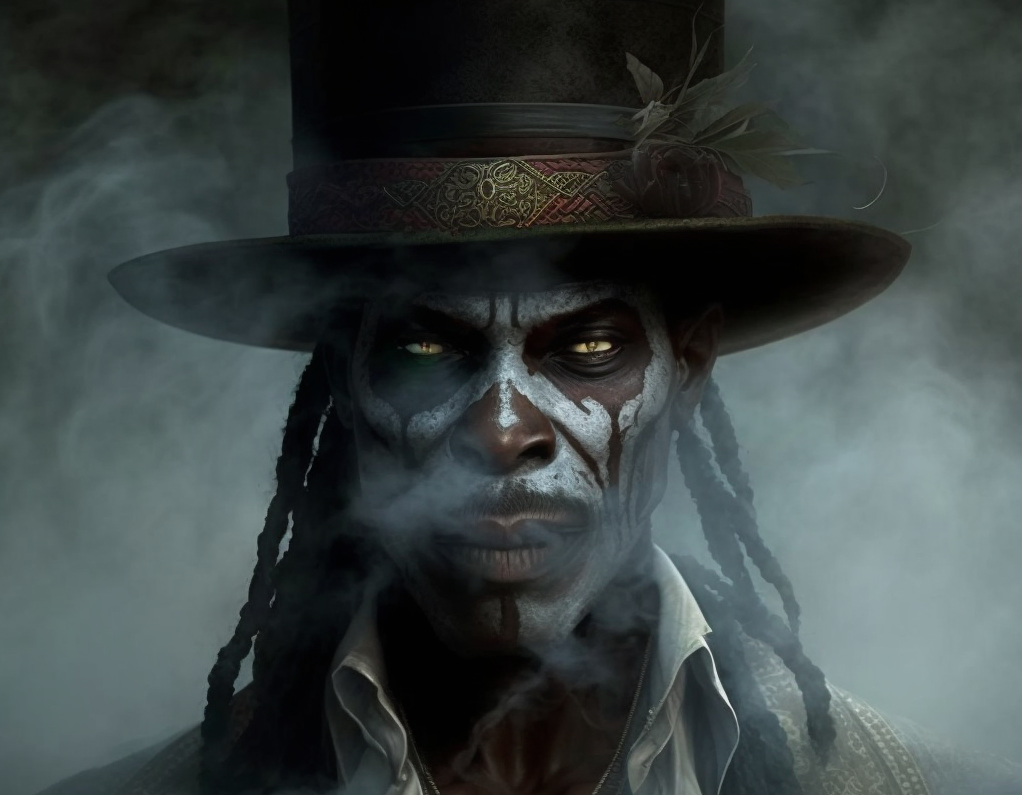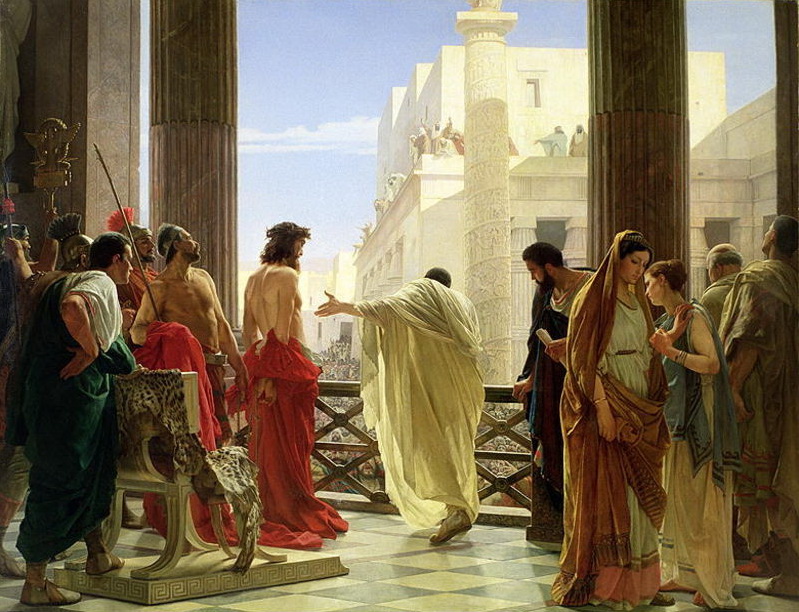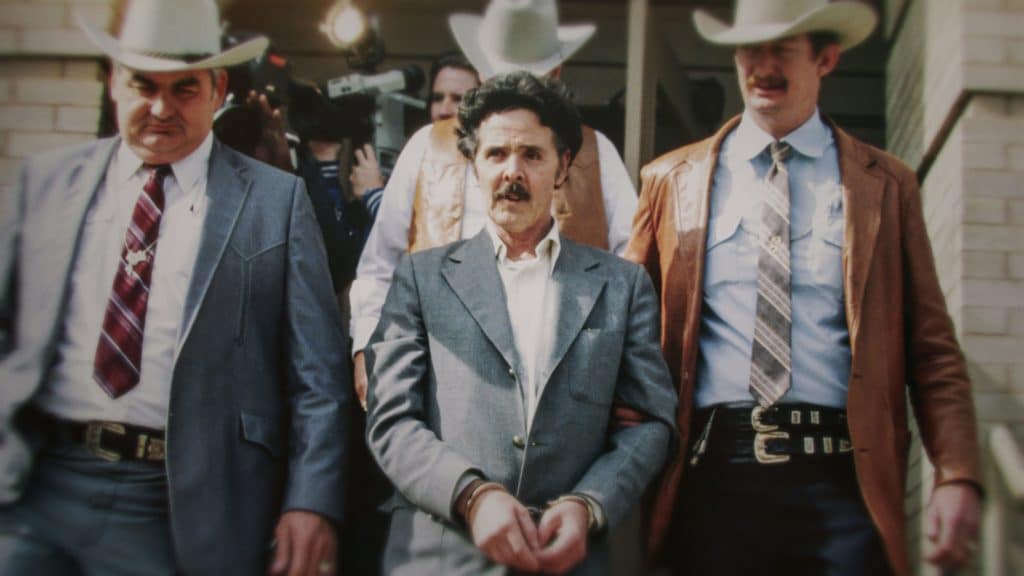Baron Samedi is an important spirit in the African diasporic religion of Haitian Voodoo.
The Baron is a Loa. In Haitian culture, this means that he is a spirit that is responsible for assisting humans in the transition between the human world and the afterlife.

Haitian Voodoo
Haitian Voodoo (or Vodou) is a mixture of Roman Catholic beliefs and African culture. It was developed during the French colonial period with influence from the indigenous peoples of Haiti.
Spirits called Iwa could be looked at much like saints or angels in Catholic culture. They are not gods, but servants of the Supreme Creator called Bondye. Many of the Iwa spirits come from gods formed in the West African traditional regions.
Following the French-Catholic faith, those who believe in Vodou are mainly monotheists – the belief that there is only one God. The Iwa deities are believed to be powerful spirits on earth which humans may interact with.
But their main goal is to bring humans back to the one true god, Bondye. Human beings are expected to love, respect, and fear the Iwa. In return, the spirits are expected to provide them with love, protection, and guidance.
The spirits are divided into three categories: Rada, Petro, and Ghede. The Ghede Iwa are specifically associated with the dead. Baron Samedi is the head of the Ghede family and is known as the father of the underworld, or the spirits of the dead.
Although the other spirits of the Ghede family are just as rambunctious and rowdy, they are not nearly as charismatic as their master Baron Samedi.
He is married to Maman Brigitte. She is a spirit associated with fertility and justice. Despite this marriage, it is believed that the Baron’s suave personality is to facilitate the chasing of mortal women, which he very much enjoys.
The Role of Baron Samedi
There are many beliefs revolving around Baron Samedi. Many of his characteristics reveal his role as a spirit of the underworld.
He is considered to be extremely intelligent as he is the all-knowing spirit when it comes to death and the underworld. If humans desire knowledge and guidance about life and death, they must cultivate a personal relationship with Baron Samedi.
Baron Samedi always wears dark, black clothes – including a tailcoat and top hat – when he leaves the underworld and travels about the land of the living. He must also wear dark-colored glasses so the light does not harm his eyes.
However, it is said that he does on occasion remove one lens of the glasses in order to observe humans and their actions. Many drawings and artwork created to represent Baron Samedi often depict a skull for a face, grinning beneath his top hat.
It is also said that Baron Samedi has a hearty appetite. His favorite foods are black roosters and black goats. The Baron is often portrayed to be drinking liquor that he made himself. It is concocted of the hottest peppers on earth so that he is the only one who can drink it.
In Greek mythology, the gods Thanatos and Hades split the jobs of guiding spirits to the underworld and ruling the underworld. Unlike these gods of mythology, the spirit, or “angel of death,” Baron Samedi serves both of these roles.
Power Over Life and Death
Although he is not a god in the Haitian religion, Baron Samedi holds the powerful role of choosing who will live and who will die. He ensures that the line between life and death is never crossed. The dead are never allowed to return to earth to torment the living.
Any human who longs to connect with someone from the underworld must go through the Baron. He decides whether he will allow the dead to communicate with the living.
In certain situations, the Baron requires a voodoo ceremony by the living, calling him to cross over into the world. Any time this situation arises, the Baron will expect a gift or offering from the living – it is said he prefers coffee, cigarettes, cigars, or alcohol.
Although his appearance and expectation for fear and respect are common, it is said that the Baron is a kind spirit who has a soft spot for children. He is known to protect children at all costs, allowing them to grow and have the chance to live a noble life.
It is also believed that he can cure any disease or injury. As long as the person is honorable and worth saving, he will always do so.
As much as the Baron is kind and thoughtful with his decisions, he is also known as a trickster. He has a raunchy sense of humor and is known to be very playful and rowdy. He encourages the living to enjoy themselves and never take life too seriously – his biggest pet peeve.
This reverts back to all Ghede spirits who are known for their discourteous behavior, cursing, and dancing in sexually suggestive ways. In the end, the Baron is always quick to remind the living that everyone must surrender to him at the end and on their way to the afterlife.
Traditions and Modern References
In many Haitian cemeteries, there is a custom. They believe that the oldest grave at the cemetery is to be designated as the grave of Baron Samedi. A cross referred to as “Baron’s Cross” is placed at the crossroads of the cemetery. A black top hat is placed on top of it.
The image and likeness of Baron Samedi has been used in numerous video games such as World of Warcraft, Shadow Fight 2, and four different versions of James Bond video games. The Baron has been adapted as characters in Marvel Comics as well as in movies such as Live and Let Die and Sugar Hill. Baron Samedi characteristics are also seen in the Disney villain Dr. Facilier in the movie The Princess and the Frog.
Although he does not want the living to take life too seriously, the Baron is trusted as the spirit who takes his job very seriously. He is the ultimate guardian of the barrier between life and death, and he takes pride in making sure souls are able to pass safely into the afterlife.

